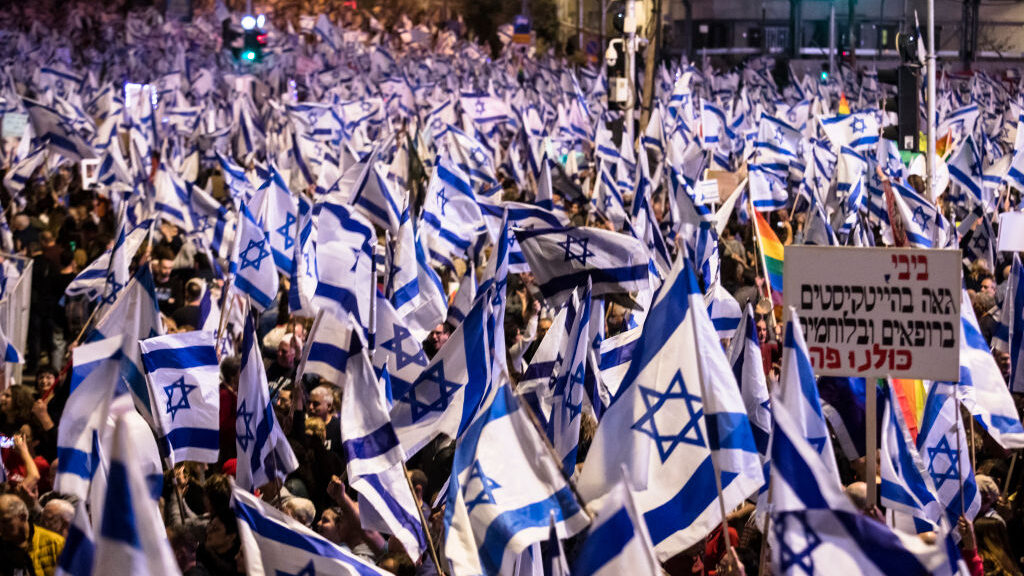Israeli Society Also Played a Role in the Tragedy of Oct. 7
Maariv, Israel, February 3
Maariv, Israel, February 3
Human events and the disasters they encompass aren’t borne out of a single cause, but rather, they originate from a sequence of causative factors. Each factor serves as a vital link in this chain of events, and neutralizing just one might prevent the entire disaster. The state commission of inquiry has already begun its investigation into the tragic events of Oct. 7, though there will likely be aspects of this tragedy that receive inadequate attention. The commission will likely concentrate on investigating the military and political entities, scrutinizing strategic oversights and the palpable lack of preparedness for such an event. However, the examination of our own responsibility as a collective society may be overlooked—we collectively failed to prevent the disaster. What might the findings reveal if our societal contributions were more thoroughly probed? The late commander of Central Command, Maj. Gen. Nehemiah Tamari is often quoted for his insightful observation: when pointing an accusatory finger, three are curled back toward you. From this, he inferred that the majority of the responsibility inevitably falls back on you; hence, it’s crucial to examine our own contributions to the event. In this op-ed, I will steer away from areas the commission will undoubtedly explore and instead focus on evaluating our societal contribution towards the lack of readiness observed on Oct. 7. One must acknowledge that our society, despite its shortcomings, managed to rally quickly, revealing a vibrant Israeli spirit we feared had been lost. An inspiring spirit of volunteerism, solidarity, kindness, and dedication emerged in the midst of war, serving as a beacon of hope in the darkness. This spirit fueled displays of heroism and self-sacrifice from our troops in the ensuing difficult battles. Tragically, these heroic men and women were often the ones to pay the highest price—their own lives. In understanding and owning our societal contribution, we can learn critical lessons about our shared responsibility. Exploring painful past failures can empower us for future crises and hopefully inspire us to act with even more dedication and bravery. After all, we have already seen sparks of this stronger, united spirit within our society. Surely, it’s possible to fan those sparks into a larger, more powerful flame of resilience and preparedness that can guard us against future disasters. Examining our past conduct, especially in the year preceding the war, it is hard not to be struck by the startling lack of wisdom that was evident. This is illustrated, for instance, by the politicians’ attempts to instigate systemic legal changes, thereby threatening the democratic foundations of our country. My concern here is not with the content but the approach, an approach that has manifested the most harmful flaws in our thinking: a mix of arrogance and disdain for opposing viewpoints coupled with an intoxication of power. These were accompanied by a pervasive pursuit of political power that often choked off more principled interest in objective analyses. National interests were also frequently subjugated to personal and party interests. Sadly, these misguided avenues of thought obscured our assessment of our adversaries’ intentions, leading us to mistakenly conclude that Hamas was inclined towards a permanent cease-fire. This mindset is perhaps best described as wishful thinking or, to use a Hebrew phrase, “false hope.” In the end, this resulted in both physical and cognitive blindness, with warnings from alert observers silenced and critical reports from our Israel Security Agency disregarded. In these trying times where our value system seems compromised, it is more critical than ever that we refocus on the foundational principles set forth in our Declaration of Independence. Our collective conduct should reflect not only our global image but also matters of national security. A societal approach where we become absorbed with our views and opinions rather than adopting a holistic view of both immanent and far-off realities can only lead to a disjointed society—an assembly of atoms rather than a unified molecule. The Israel Center for Promotion of Fairness has been championing for several years the notion of fairness as social cohesion, a concept that seems increasingly absent in our locales despite being a cornerstone of our founding principles and the vision of our Declaration of Independence. This is powerfully encapsulated by our troops in Gaza, whose messages of endurance and unity ring out in their calls for peace back home. Fairness—treating others with dignity, honesty, and kindness without exploiting their vulnerabilities—is instrumental for victory. Not just in the horrors of war but also in the tranquil times of peace. While the inquiry commission on the war may not venture into these social territories, if we fail to realize and internalize this lesson, we dishonor the memory and sacrifice of the fallen. If from this chaos arises a renewed call for a societal reawakening guided by these principles of fairness, then we may emerge stronger from the devastation. We can then just then justly honor our fallen heroes, not with mere words or hollow respect, but with a society founded on the principles they bravely defended: fairness, unity, and uncompromising respect for every individual. Their memory deserves nothing less. This will be their enduring legacy and our victory. —Ehud Peleg (translated by Asaf Zilberfarb)


